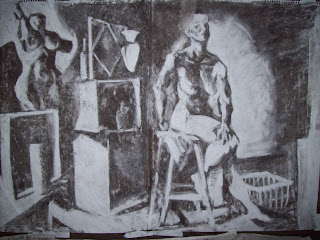A review: Blankets by Craig Thompson
You can make your superhero a psychopath, you can draw gut-splattering violence, and you can call it a "graphic novel," but comic books are still incredibly stupid.
- Bill Watterson, The Calvin and Hobbes Tenth Anniversary Book
Reading that quote, an ardent comic book fan would probably accuse Watterson of being just an angry traditionalist, kicking out against the emergence of a new form within his chosen medium. Yet walking into a comic book store, even the nerd in me has to agree with him to a certain degree. Spandex-clad muscle men and anorexic women pose, snarl and pout from the end caps of every aisle. Violence without context or meaning fills the covers of these books, displaying the kind of floundering, misguided attempts at maturity that define adolescence.
So why do I waste my time reading these things? Certainly, there is some element of the child in me that just likes to see things get blowed up real good, but mainly, I read comic books for those few times when I get surprised by something really, really amazing. There are of course a few high-profile comics that are recognized by society at large as worthwhile, such as Daniel Clowes' brilliant Ghost World, or Persepolis by Marjane Satrapi – both championed by Oscar-nominated movie adaptations. Beyond that, though, are the books that sit unassumingly on the shelf and grab you unexpectedly, as I was grabbed last week by Blankets.
Blankets is a memoir, chronicling the author’s childhood in a small farmhouse in the Midwest. It takes place almost entirely in winter, filling every panel with snow-covered landscapes that are drawn beautifully and poetically. The story could not be told in this way in any other medium – the images weave in and out of the panels, connecting and flowing and creating an effect that film could never achieve.
In this book, Thompson recounts with painful honesty the story of his dual teenage obsessions with his Christian faith and his first love, and the eventual loss of both. It is at times overly indulgent to the drama of his teenage years, but as the story continues and the character grows older, the tone matures to a more thoughtful meditation on the author’s memories of childhood and how he feels about adult life. This is a haunting book, and one of the best “graphic novels” that I have ever read.




















